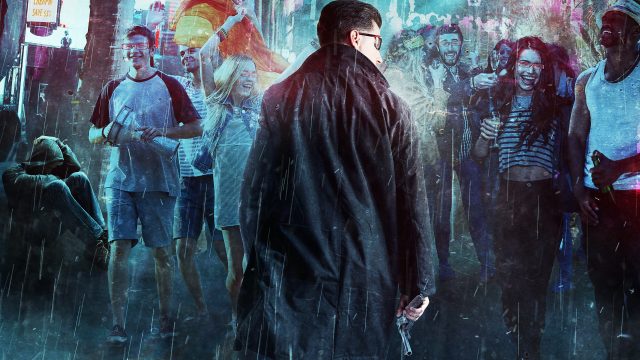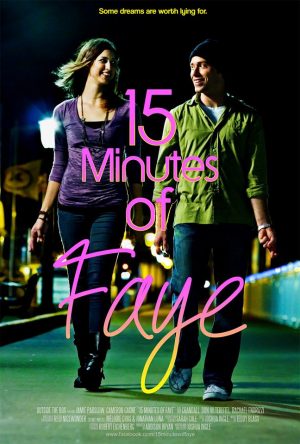
My newest book, Dead Links, traces its origins back to my freshman year in college. It’s hard for me to go into detail about the professor whose ideas inspired the story without A.) spoiling the story for anyone who hasn’t read it, and B.) getting awkward, because I only ever met this professor once and I based one of my main characters on him. But he had some pretty cutting edge ideas about storytelling and what it could do that started my mental gears turning. I put my own spin on his ideas, gave them to a fictional character, and used them in Dead Links as a lens through which to examine the ethics of the whole entertainment enterprise that we humans have placed at the center of our modern culture.
But this story sat in my head for a long time. The germ of it first hit me immediately after meeting this professor and hearing him talk, but it didn’t start to grow until I got to grad school.
In the grad school I went to for film, we were required to make a feature-length film as part of the curriculum. A first draft of our script for this film was due on our very first day. Being the studious scholar that I am, I procrastinated through the whole summer and suddenly found myself with one week left until school started, with no script. So I ransacked my old story ideas to see if any sounded interesting enough to make as my grad school film.
In the course of this ransacking, I found it: “Oh yeah, that one murder mystery idea about the ethics of entertainment. That actually still sounds good. I’ll make that one!”
I wrote the screenplay in one week. I called it Tomorrow, which is weird in retrospect, because this first draft was set in present day, with few of the futuristic elements of Dead Links. I think the name was intended to be a cryptic warning about what might happen tomorrow if we don’t solve our problems today, or something. I really wasn’t a pretentious art geek at all. No, not me.
Obviously, this wasn’t at a stage in my life when I planned things out in advance very well. The script was full of plot holes and the characters were thin. My screenwriting class tactfully dissected it, and I actually thank them all in the acknowledgements at the end of the book, because that class, to me, was like a big map for discovering where I wanted to take this story. Don’t go that way—it’s a dead end. Turn at this corner, and then that one. X marks your final destination.
Shortly after I finished my second draft, the hammer came down from above. The film school rejected my script. Of the two reasons they rejected it, reason number one was legitimate: it was simply too expensive. They were completely right about this, and considering that the students’ films were self-funded, their rejection saved my ass. If I’d tried to make this story as a film back in the arrogant and reckless days of my early twenties, it would’ve been a train wreck.
Their second reason for rejecting my script was a bit more nebulous, and was never spoken aloud. But the strong implication swept through the undercurrents of many conversations I had about this story: “We don’t approve of sci-fi at this school.” Not every professor held this view, but it was common. I thought then, as I do now, that this was a bunch of bullshit, but the film was obviously too expensive and I couldn’t make it anyway, so I didn’t press the point.
I’m still curious about why academia has such hostility to genre work—sci-fi, fantasy, and horror. Some of our culture’s most important art of the last century falls under these umbrellas. They remain some of the most popular genres, and you’d think educators would want to utilize and encourage the art that actually connects with people. But the ivory tower still sees these genres as being beneath them. It wasn’t just my school, either—I’ve heard many of my friends at other schools, and several of the professional writers I know, lament about experiences with academia similar to my own. Art is, to me at least, an act of communication more than it is anything else. So I think you’ll have a lot of trouble communicating if you actively detest the types of work that resonate with your culture.
Sci-fi, fantasy, and horror are also great tools to use for storytellers who want to have a positive impact on the world. These genres distance your audience from your subject matter, so introducing a controversial idea in a new context, or as a metaphor, within these genres can open an audience’s mind to that idea far more than if the idea had just been preached to them in a conventional narrative.
But that’s a whole other discussion. I digress. Back to the main story:
I shelved Tomorrow and wrote a new script called 15 Minutes of Faye. This script was cheaper and aligned more closely with my school’s genre expectations, so this was the film I ended up making. (And all these years later, it still isn’t done! Turns out movies are expensive—who’d have thought? I’m aiming to finish it later this year.) I actually really like the way it turned out, and I’ll post on here and Facebook when it’s finished to let you know where you can see it.
Hey! Another digression. Back to the main story again. Although I shelved Tomorrow, I intended to eventually return and do something with it, and I got my chance sooner rather than later.
When I decided I wanted to write books instead of make films (a decision which warrants a huge blog rant at some point in the future), I chose Thorn as my first project. Thorn was a massive, sprawling, epic thing to write, and although I loved it, writing it got exhausting after a while. My brain needed a break from writing about demons and the expansive story world I’d built for them to live in. So I figured why the hell not start writing Tomorrow as a novel? No commitment required. I’d just write it in bits and pieces whenever I got tired with Thorn. I already had the whole story outlined in extreme detail—I had a whole screenplay to work off of. And I could set it in a story world totally different from Thorn’s. Perhaps in rebellion against my old film school, I decided to revamp the story’s setting, and set it twenty years in the future, making it even more sci-fi.
(I’d always been into sci-fi, but I only really started getting into futurism after I graduated. Futurism is so cool and important that I wrote a whole blog post about it and you should go read that next.)
So bit by bit, over the last year of writing The Thorn Saga, this new sci-fi book began to snowball as well. Once Thorn was all done and tucked away I hit Tomorrow hard, changing its name to Dead Links only recently, because Tomorrow is a horrible title that I came up with when I was a baby twenty-one-year-old.
And there you have it. What began as a cool story idea in 2005 has become a finished novel in 2018, depicting one possible version of our world in 2038 and exploring how the entertainment industries might evolve over those twenty years. It’s a pseudo-cyberpunk book about the future, about our obsession with stories, and about the ethics of storytelling. But most of all, it’s a damn good murder mystery. I tell you in the third chapter who the killer is, but the real mystery is how he did it, and more importantly, why. You’ll never see the twists coming.
Dead Links is available now on Amazon. Enjoy it!





